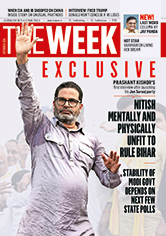Since 2014, Prashant Kishor’s career has seen him orchestrate winning campaigns across India, and now he is taking a bold step with Jan Suraaj (‘Lalu no longer active; Nitish almost a lame-duck chief minister’, October 13).
Kishor has enough time to create political ripples before the assembly elections in Bihar, scheduled for November 2025. This is going to mark a significant onward integration in his political journey as he transitions from a backroom strategist to an influential politician.
Vandana Chopra,
On email.
It is encouraging to see a leader like Kishor challenging two seasoned politicians in Bihar and a national party like the BJP. His approach, marked by professionalism and data-driven insights, is the result of a two-year padayatra and deep grassroots engagement with the masses. In a state like Bihar—plagued by caste divisions, overpopulation and underdevelopment—this presents a wearying challenge. Only time will tell if Kishor’s strategy will succeed.
By contrast, Arvind Kejriwal had an easier path in Delhi thanks to his then-clean image and the fact that the region is closely overseen by the Central government.
K.V. Jayaram,
On email.
I truly applaud Kishor’s Jan Suraaj, which focuses on three key principles: transparency, accountability, and participation. Your cover story effectively highlighted how Kishor’s team aims to bridge the gap between citizens and policymakers. I wholeheartedly commend Kishor for the effort. May his visionary leadership and unwavering commitment empower future generations of Bihar.
Vichu Viswanathan,
On email.
Balancing act
India’s position on the Israel-Palestine conflict reflects a complex balancing act between her historical support for Palestine and her mushrooming relationship with Israel (‘Mani-festo’, October 13). While India was one of the earliest nations to recognise Palestine, recent years have seen a shift, with the Narendra Modi government remaining visibly silent amid round-the-clock crises. It raises concerns about whether India is straying from its long-held moral stance on global justice.
Sukrutha Puravankara Pradeep,
On email.
In Sheila Dikshit’s footsteps
Atishi has been a key figure in the AAP, especially after Manish Sisodia’s arrest, during which she emerged as the party’s fiercest critic of the BJP (‘Call of duty’, October 13). Atishi’s journey with the AAP dates back to its inception, where she played a pivotal role in drafting the party’s manifesto for the 2013 assembly elections. Known for her clean image and commitment to activism, she may resonate with women voters, much like Sheila Dikshit, who served for 15 years and commanded significant support among women.
Sanjay Chopra,
On email.
Vijayan spoils it
Pinarayi Vijayan was never initially expected to become the chief minister. In 2016, when he became the CM, many left-leaning voters in Kerala felt betrayed, as they had anticipated that veteran communist leader V.S. Achuthanandan would assume the role (‘Captain’s crisis’, October 13). Vijayan claims that his experiences with police brutality during the Emergency shaped who he is today. However, there are serious concerns about his behaviour and demeanour. He cannot continue to carry on with such arrogance—it risks backfiring, and some have already likened him to a modern-day Nero.
Kerala is home to many grounded, good-hearted people. Vijayan would do well to engage with them, learn from their humility, and imbibe their positive qualities.
Mridula Balakeshvan,
On email.
Vijayan’s actions and statements have put the communist parties in Kerala on shaky ground. In the coming years, many communist sympathisers in the state will shift their allegiance to the BJP.
By the 2036 assembly elections, the primary contest in Kerala could well be between the Congress and the BJP. The Congress is expected to be largely supported by Muslims and Christians, while the BJP should have the backing from mostly Hindus and former communists.
Renu Pradeep,
On email.
Follow Narasimha Rao
K.C. Verma should have applied the “Narasimha Rao principle” for the problem he faced (‘Otherwise cracked’, October 13). Just sleep over the problem for a few days, without responding to the complaints. Of course, you may have to face abuses. Doesn’t matter. This is an everyday matter in every household.
Balakrishnan,
Bengaluru.
Keep mouth shut
I completely agree with Baijayant ‘Jay’ Panda that no politician should attack domestic political opponents when they are on foreign soil (‘Last word’, October 13). To create a dangerous narrative on foreign soil is the last thing that any Indian politician should do.
Seeking the sympathy of foreigners to score brownie points in the country is unacceptable. Even when the UPA-led Congress was in power, the BJP leaders as far as I know, never criticised prime minister Manmohan Singh and his policies while travelling abroad. That’s how it should always be.
Yash Tripathi,
On email.
I don’t see anything wrong with Rahul Gandhi criticising Narendra Modi abroad in front of a foreign audience. The BJP can act however it wants, but its leaders create an uproar when others do something that doesn’t suit them. What kind of logic is that?
Radha Saxena,
On email.

